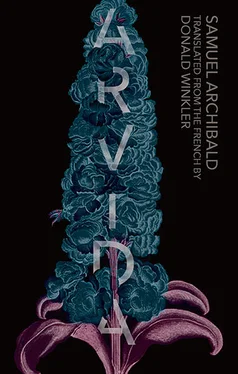“Why did you ask Raisin to help you?
“He’s my friend.”
“You’re Raisin Tremblay’s friend? That’s news to me.”
“Aw, you know what I mean. He helps me with my rock garden in front, I give him some painting contracts, things like that. Sometimes he comes over for a beer. He knows about guns.”
“Raisin Tremblay knows nothing about anything. And are you going to tell me why you’d ask a semi-retard to help you try out your rifles at two in the morning?”
“I know, I know. It wasn’t a good idea.”
The two men stared at each other.
“Do you have any more questions?”
Leduc cleared his throat.
“Are you sure you don’t have any other answers to give me?”
Sanguinet kept to his story, and later that day, after having been released, he went to pick up Raisin at the police station. They didn’t exchange a word during the trip. Sanguinet left him off in front of the Blackburns and said goodbye, but Raisin got out of the car and went in without saying a word.
That night, Raisin took part of Martial’s five hundred dollars and went to buy a lot of beer at the corner store. He walked as far as the baseball field, where for the time being there was no last-born in sight, sat on the players’ bench, and downed, one by one, the twenty-four bottles in the case. Zigzagging home, he looked like a domestic bull to which one had administered a powerful sedative. At the steps to the Blackburns, his cat, which had again run off, was rolled into a ball in front of the door. Raisin grabbed the cat by the skin of its neck, kicked open the door, and heaved it inside. In the air, the terrorized animal, which was not a cat but a skunk, emptied its sphincters full force, showering Raisin and the walls with a foul liquid, part ammonia and part excrement.
Raisin felt sick, he wept from the pain and the sadness, and didn’t know what to do. He reeled, reeking, the three blocks to Sanguinet’s house, and knocked at the door. Sanguinet opened it, and without giving him a chance to dodge his embrace and the odour that came along with it, Raisin sobbed in his arms for a good half hour.
They spent part of the night cleaning Sanguinet’s house, slept for a few hours, with Raisin on the couch and Sanguinet in the bedroom, and on waking they went together to disinfect the Blackburns’ so they wouldn’t have to face the nauseating smell when they returned from their vacation.
From that point on, Sanguinet began to take Raisin with him on his rounds. The word was that Sanguinet had decided that Raisin’s big fists could be good for something, and that he’d made him his collector. In fact, Sanguinet never asked Raisin to beat up anyone, never mind to kill somebody. And he never even asked him why he’d come knocking at his door that night with a rifle in his hands.
The next year, during the summer, without thinking, Martial, who’d tried hard to forget the whole story and given up for good on getting his five hundred dollars back, let his feet guide him to the front of the Blackburn house. Sanguinet and Raisin were there on the stoop, beers in hand, watching the sun go down behind the backstop. Raisin waved to him.
“Hey, Martial.”
Martial froze and broke out in a sweat. He waved back.
“How ya doing, boys?”
Sanguinet offered:
“Come have a beer with us, Martial.”
Martial still hesitated, then, not knowing what else to do, he sat down beside them.
The night was soft and calm, and you could hear the stomachs of Raisin and Martial as they gurgled in the evening air. At first, all three sucked on their beers in silence, then the conversation found its rhythm. They talked about the weather, the sports scores, and the enticing neckline of a barmaid at the brasserie. Subjects that seemed to have been invented, that night, just for them, just so people like them might have something to talk about.
Hardly anyone believes me, but when I bought the house in 1993 it had settled so far down that I had to take eighteen inches off the height of each wall before shoring up the foundations. I revved up my chainsaw right in the middle of the living room and carved away like a madman, just watching so as not to slice through any load-bearing beams. It was no big deal because in the beginning it was all mine to fix up. A lot of people said “That couldn’t be,” and I don’t blame them because there are lots of stories that are hard to fathom when it comes to that house.
When I saw it for the first time it was on behalf of a client. Armand Sénécal. He was going to buy it, and he asked me to inspect it first. I came along Rue Forster, turned up the driveway with its five hundred-year-old trees on each side, and parked in the turnaround at the end, right in front of an imposing residence that seemed really small under the trees. I let out a whistle, sitting alone in the car. I loved that house at first sight, and then a bit more with each defect I found there that would put Armand off. The roof was a disaster, and I would have bet anything that what was just under it was rotten too. The second and third floor walls showed clear signs of water infiltration. The basement was a humid cave, and you could tell just by the smell that the French drain was clogged. The tennis court in the back was nice, but it had been left untended for at least ten years. And then there was the icing on the cake. All across the property there were things the agent tried to pass off as sculptures, but that looked like junk picked up in a scrapyard: steel rods wrapped in barbed wire in the middle of a flower bed; big sheets of iron and copper soldered to look like African masks and fastened to stakes here and there on the front lawn; beside the tennis court there was an old yellow bus planted upright in the ground, with five big tractor wheels around it. A yellow bus sticking straight up in the air, I swear on my daughter’s head.
Apparently the house belonged to the Villeneuve family, town notables who’d owned a number of businesses in the region, beginning with a rock quarry lower down on the hill, towards the Saguenay. Armand said there was an old path starting behind the house, which brought you there on foot. The house was the family’s summer home from about the 1910s to the 1960s. The last residents were Viateur Villeneuve, his wife Claire, and their four children. Old man Villeneuve was a pretty well-known local artist. He’d taught at the trade school, where they did woodwork and cabinetmaking. The children were gone, the old man was dead, and now Madame Villeneuve wanted to sell the house, which was too big for her.
I asked Armand:
“How much does she want for it, Madame Villeneuve?”
“Two hundred and fifty thousand.”
“Well, if you pay two hundred and fifty thousand for that, you can be sure of two things. First, you’re going to regret it, and second, I’m going to go all over town telling everyone ‘Armand Sénécal has a heart of gold.’”
Saying that about anyone around here is not exactly a compliment. Armand swore under his breath, then said:
“How much would you give, at the most?”
“A hundred and eighty five, maybe a hundred and ninety thousand. That’s if I had two hundred thousand more to sink into the renovations, and ten years of my life to spare.”
He thanked me, and we each went our way. Two days later, Madame Villeneuve, in person, called me at my office. She sang me a chorus of insults. She even tacked on some “ crisses ” and “ tabarnacs ” that coming from her had the ring of responses committed to memory for Mass. When she’d finished her bit of theatre, I put in, “Madame Villeneuve, I’m going to tell you something. Your house, I want it. I’m going to give you a hundred thousand dollars for it, with a disclaimer clause in the act of sale. That way you’ll be sure that I’ll never go after you for a hidden defect. Talk to some people with their heads on straight, if you know any. They’ll tell you that you’ll never get more than that.”
Читать дальше












